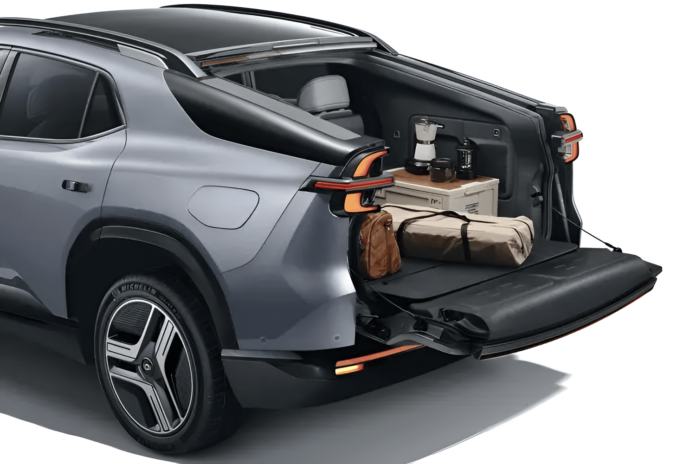Changan’s official announcement confirms that the Qiyuan E07 (Nevo E07 in international markets) will be launched on October 21. Pre-sales for the vehicle began on September 22, offering multiple versions: the EREV Max Smart Driving variant starting at 249,900 yuan, the EV Max Smart Driving variant at 269,900 yuan (37,900 USD), and the EV Ultra High-Performance variant at 319,900 yuan (44,900 USD).

Built on Changan’s SDA architecture, the E07 blends SUV and pickup design elements and is available in pure electric and range-extended versions. The vehicle features a closed front grille, C-shaped LED headlights, and a rear design incorporating a wraparound tail light. Its dimensions are 5045 mm in length, 1996 mm in width, and a wheelbase of 3120 mm, with a height ranging between 1640 and 1695 mm, depending on the variant. It also offers 20- and 21-inch wheel options.

The Nevo E07’s interior adopts a minimalist approach, forgoing a traditional instrument panel in favor of a 28.86-inch AR-HUD (augmented reality head-up display) and a 15.4-inch central control screen. Other features include a retractable tailgate that allows the vehicle to switch between SUV and pickup configurations, with a load-bearing capacity of 300 kg.

In terms of performance, the EREV version is powered by a 1.5T range extender coupled with a rear electric motor producing 231 kW (310 hp). A dual-motor option adds a 131 kW (176 hp) front motor, giving the vehicle a combined output of 362 kW. The battery capacity is 39.05 kWh, allowing a pure electric range of 200 km for the single-motor version and 185 km for the dual-motor version.

The EV variant is equipped with more powerful motors, offering 252 kW for the single-motor setup and 188 kW for the front motor in the dual-motor configuration. Depending on the model, the vehicle’s range varies from 551 km to 1,000 km, supported by an 800V high-voltage charging system that can add 365 km of range in just 15 minutes of charging.

Advanced driver assistance systems come standard, with the E07 featuring two lidars, five millimeter-wave radars, 12 ultrasonic radars, and 11 cameras, all powered by NVIDIA’s Orin-X intelligent driving chip. This setup supports Level 2+ autonomous driving capabilities. The car also integrates satellite communication technology, positioning it as a high-tech option in the growing EV market.


